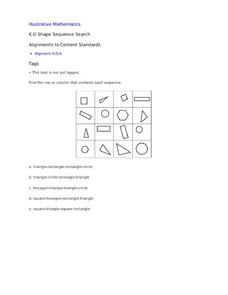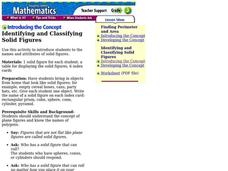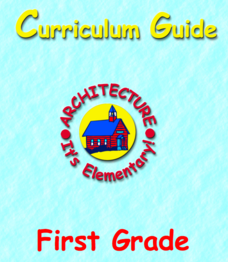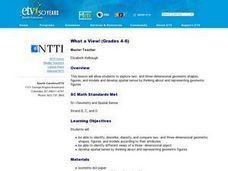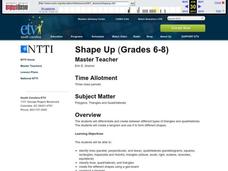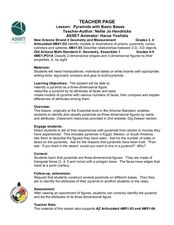Curated OER
3-D Figures Part 1
Elementary schoolers explore 3-D shapes. They transition from thinking of shapes as only 2-D. Pupils read Cinderella as a launching activity for their upcoming adventure, and explore a new world of 3-D shapes in this introductory lesson.
Curated OER
2-D and 3-D Presents at Pedro's Party
Fifth graders draw 2-D and 3-D shapes. They sketch and label geometric figures with correct terminology, then explore parallel and perpendicular lines. Pupils sort and classify shapes drawn.
Curated OER
Branding Circles, Squares, Rectangles, Triangles
Compare and classify 2-D shapes! Kindergarteners inspect the attributes of plane shapes and examine shapes in everyday life. They label the circles, squares, rectangles, and triangles they find. This is the website where you can find the...
Pennsylvania Department of Education
Shapes Around Us
Learners use manipulatives to study shapes. They sort shapes and use correct geometric terminology to describe them. Students find real-life examples of 2 and 3 dimensional shapes, and classify figures in their classroom according to...
Curated OER
Circles 1, 2, 3, 4
Here is a way to help your charges identify circles and spheres. In this shapes geometry and technology lesson plan, students identify and draw circles and explain the related attributes. They recognize circles and spheres while...
Illustrative Mathematics
Shape Sequence Search
Learning that size and orientation don't affect the classification of shapes is a big step for young mathematicians. Support children with developing this key understanding by looking at the array of shapes included in this resource. For...
Curated OER
Shapes in Our World
Help your students explore shapes. They classify shapes and identify them in their everyday world. Plane shapes are explored, and they classify and identify the plane shapes.
Curated OER
Compare 2-D Shapes
Second graders explore and analyze plane shapes. For this plane shapes lesson, 2nd graders evaluate shape attributes to classify shapes correctly. Students work in groups to create different shapes.
Curated OER
Shapes
Students identify attributes of different geometric shapes. In this geometry lesson plan, students view a PowerPoint presentation on shapes and use attribute blocks to examine the corners and edges of each shape. Students work...
Curated OER
Sorting and Classifying
Fifth graders are engaged in sorting and classifying geometric shapes of various colors and sizes. They discuss the properties of these shapes and illustrate a range of classifications using Venn diagrams.
Curated OER
Classify Prisms
Middle schoolers classify prisms according to their attributes. In this classifying prisms lesson, students explore different prisms. Middle schoolers generate observations of the attributes and classify the prism correctly.
Curated OER
Identifying and Classifying Solid Figures
Students identify and classify solid geometric figures. In this geometry lesson, students bring in objects that look like solid shapes and identify their attributes. Students identify the number of surfaces and faces on each figure.
American Institute of Architects
Architecture: It's Elementary!—First Grade
Build an interest and appreciation for architecture in your young learners with this fun 10-lesson art unit. Engaging children in using their five senses, the class first observes the environment around them, paying...
Curated OER
What a View!
Students examine two- and three-dimensional shapes and figures. Individually, they practice identifying the shape from various viewpoints. By completing this activity, they develop a spatial sense about how figures and shapes are...
Math Drills
Classifying Prisms and Pyramids
Young geometers identify prisms and pyramids based on the number of edges they have. Answers vary from hexagonal and rectangular prisms to pentagonal and octagonal pyramids.
Curated OER
Small and Large Squares
Young mathematicians classify squares according to attributes. They sort squares according to specific attributes. Students explore squares in repeating patterns and order squares according to size. Engaging extension activities are...
Curated OER
Geometric Shapes
Students identify polygons. In this geometric shape lesson plan, students explore the characteristics of polygons. They identify polygons, and classify triangles according to their sides and angles. Students create a...
Curated OER
Shape Up
Middle schoolers explore differents types of triangles and quadriaterals. In this polygon lesson, students model identify and compare two and three dimensional geometric figures. Middle schoolers create tangrams and discover the...
Los Angeles County Office of Education
Assessment for the California Mathematics Standards Grade 2
Test scholars mathematic skills with an assessment addressing addition, subtraction, multiplication, place value, measurement, geometric shapes, expanded notation; and their ability to compare numbers, write number...
Curated OER
Connecting Formulas Related to Geometric Figures
Students identify diagrams of quadrilaterals and circles by different names and classify the figures. They name the areas for each diagram and practice solving the formulas for each.
Curated OER
Classifying Polygons
Seventh graders participate in a polygon hunt. In this polygon lesson, 7th graders examine how polygons are alike and different. Students create a Venn diagram and label the sorting circles. Students work in cooperative...
Curated OER
Figure It Out - Polygons
Sixth graders explore different polygons. In this polygon lesson, 6th graders examine a rhombus, quadrilateral, parallelogram, and rectangles. Students compare and contrast polygons and research shapes on the Internet.
Curated OER
Pyramids with Basic Bases
Students explore pyramids. In this math lesson, students discuss where they have seen examples of pyramids. Students classify pyramids as three-dimensional figures and identify their attributes.
Curated OER
Identify Polygons: Algebra/Geometry Institute
Eighth graders classify geometric figures. In this polygon lesson, 8th graders identify given geometric figures. They compare and contrast different polygons. Students name line segments, identify parallel lines, and...





